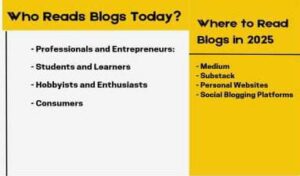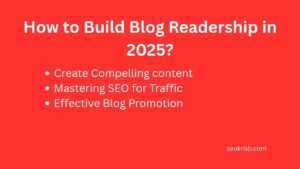
Are blogs still a thing? Blogs remain popular in 2025 for communication, learning, and company growth. Staying current in the digital age requires creating and marketing engaging content.
1) History of Blogging
Understand how blogs started and developed before debating why they’re still vital in 2025. The term “blog” derives from “weblog,” which originally meant recording online activities and ideas. Blogs started as text articles on personal experiences and thoughts.
Justin Hall’s 1994 blog “Links.net,” was arguably the first notable. A personal home page with links and writing, the website was an early blog. Blogging didn’t take off until the late 1990s and early 2000s. Blogger (1999) and WordPress (2003) make blogging easy for non-coders.
People originally wrote blogs to express themselves and share tales. Blogger sites grew easier to use, and people, corporations, and political parties realised blogs might help them reach more people. Blogs became a wonderful method to communicate news, promote companies, and connect with specialised groups. If you’ve wondered, “What is that blog reading site?” it refers to websites where users may read blogs on a variety of themes. Today’s digital world needs blogs.
2)Are blogs still a thing?
Blogs have lived and grown in a world where social media and other content-sharing sites are becoming more popular. Are blogs still relevant in 2025, here discuss several important reasons:
- Ownership and Control
Bloggers are in charge of their content and how it is presented, unlike social media sites, where computers decide who sees it and how much people interact with it. This lets bloggers be more creative, find their style, and build their business without worrying about third-party platforms getting in the way. Do people still blog? Yes, blogging is still a valuable and personal way to present yourself and build your business in the digital world we live in now.
- Short Form Content

Short form content works well on social media, but blogs are better for long-form writing that can go into more detail. Many people read and share long-form blog posts. Because there is so much information, people are looking for in-depth articles that give them more worth and understanding.
It’s still true that blogs are one of the best ways to improve your SEO. Google and other search engines like them like it when bloggers write about specific terms and answer user questions. This brings people to their websites and helps them get new readers or customers.
- Monetisation

Blogging in 2024 has shown out for many to be a profitable career path. Paid content, affiliate marketing, and adverts have let writers’ profit from their postings and run their blogs like companies. Making money is one major factor explaining why blogging will still be useful in 2025.
- Community and Engagement
Compared to social media, blogs offer a more personal and intimate connection. Bloggers can engage meaningfully with their audience through comments and email newsletters, fostering authentic relationships. This interactive space creates a strong sense of community, attracting readers who value genuine communication and deeper connections with content creators, beyond the fleeting interactions of social media.
The Function of Blogs in Business and Personal Branding
Blogs remain vital for businesses in 2025, serving as powerful tools to connect with customers, establish trust, and drive sales. They offer a platform to share valuable insights, showcase expertise, and engage audiences. By addressing customer needs and enhancing brand credibility, blogs help businesses build lasting relationships and maintain a competitive edge in the digital landscape.
- Building Authority
Companies that regularly write good blog posts show that they know what they’re talking about. Giving away useful stuff like case studies, lessons, and insights is a great way for businesses to become stars in their area. This makes people more loyal to the brand and more likely to revisit their website for more details.
- Strategy for Content Marketing
Blogs are essential to any content marketing strategy. More people visiting a business’s website can turn into leads and sales. SEO-optimized blogs get free traffic, so they don’t need to pay for ads.
- Personal Branding
It’s great for people to build their business by blogging. People in business, academia, and other fields can share their information, thoughts, and experiences, which helps them become masters in their field. Rich people like Tim Ferriss and Neil Patel have used personal blogs to build their names and find business possibilities.
Why blogs are still essential in 2025
Blogs are still helpful because they offer something else that other types of material can’t. This is still true in 2025: blogs are the best way to find detailed, well-researched information. Blogs help people understand things better, whether they are trying to learn a new skill, read reviews of products, or get professional advice. People may often ask, “do people read blogs anymore?” the answer is clear: blogs are still very popular. There is a unique chance for companies and people to talk to their audience directly through them, sharing news and information that other platforms might not be able to do as well.
3) Are blogs still read?

Reader Perspective 2025
Though how people obtain their news has drastically altered with the emergence of social media, podcasts, and video platforms, people will still read blogs in 2025. In the fast-paced world of computers and the internet, then the issue is “are blogs still popular”? Yes, blogs are still essential for people to learn and make decisions. The key is to figure out why people read blogs and why the trend is still going strong.
- Looking for Information
Many people read blogs when they need correct, in-depth information. On social media, posts can be short or false. But blogs include long-form, well-researched, valuable content. Whether your interests are in learning new skills, following news in your profession, or solving a problem, blogs remain a great source of knowledge.
- Reading Without Distractions
Social media is full of things that can take your attention away, but blogs give you a place to read without interruptions. Blogs are a better way to spend time for people sick of short, fast-paced content on sites like Twitter and TikTok. Ads and messages don’t get in the way of readers’ time to fully absorb the content.
Who Reads Blogs Nowadays?
The people who read blogs have changed a lot. It’s not just certain types of people who read blogs in 2025. Blogs are useful for many people with different hobbies and needs. In 2025, these are some of the main types of people who read blogs:

1) Professionals and Entrepreneurs– Blogs are an excellent way for professionals to stay ahead of their fields by giving them strategies, market insights, and niche knowledge.
2) Students and Learners– Blogs are an excellent way to stay informed for students and people who want to learn. They contain organised, easy-to-read material that can help people improve themselves, learn how to write better academic papers, or learn a new language.
3) Fans and Hobbyists– People interested in fitness, cooking, travel, and photography continue to read blogs to learn more about the things they love. Niche blogs bring people together and provide information that mainstream media can’t match.
4) Consumers- People often read blogs to find reviews, similarities, and product suggestions before buying them. Blogs are essential to the customer journey because they affect how and what people buy.
Where to Read Blogs in 2025

Because there are so many sites, viewers have a lot of choices for how to read blog posts. In 2025, these are some of the most popular places to read a blog:
1) Medium– Because of its high-quality, long-form material, Medium has become a popular place for people to find good to read blogs on various topics.
2) Substack– This site lets people subscribe to emails that often double as blogs. It’s popular with freelance writers and perfect for people who want to read in-depth articles about specific subjects.
3) Personal Websites– Many blogs still publish their posts on their websites because this gives readers a more personalised experience, helps them build their brand and connects them with their readers.
4) Social blogging sites– People who prefer concise posts or professional insights often turn to platforms like Tumblr for creative expression or LinkedIn for business-focused updates, making these sites ideal for quick reads and industry-specific content sharing.
The Data Doesn’t Lie
According to recent data, blogs continue to thrive in 2025, proving their relevance in the digital landscape. Over 77% of internet users actively read blogs daily, highlighting their popularity and reach. Businesses that prioritize blogging see 67% more leads compared to those that don’t, showcasing the significant role blogs play in driving growth. Additionally, engagement with long-form blog posts is on the rise, as audiences seek in-depth and valuable information. These trends confirm that blogs are not just surviving but are steadily growing in influence and importance.
4) Debunking the Myth of Are Blog Dead
Why the “Blogs Are Dead” Debate Exists
Many individuals continue to believe that “blogs are dead” despite the fact that they are quite popular. A significant number of opponents argue that the rise in popularity of social media and video websites demonstrates that blogs are no longer required. The fact that Instagram, TikTok, and YouTube are so popular indicates that consumers enjoy content that is either brief or visual.
Why Blogs Are Far from Dead
Are blogs dead? This argument ignores how, like other digital platforms, blogs have evolved over time. Blogs have established themselves as a significant part of the digital world; it is not social media or video that has led to their dominance. They continue to provide long-form material, which is more beneficial than short-form content since it allows you to learn more about a subject and is more comprehensive.
5) How to Build Blog Readership in 2025?
How do you get people to read your blog? is discussed here.

Create Compelling Content
Creating material for your readers that resonates to them will be the most crucial thing blogging has to accomplish to succeed in 2025. You have to provide value that addresses the issues, challenges, and knowledge gaps of your readers by means of which they cannot readily obtain elsewhere. Writing posts is not enough. Do surveys, read comments, and monitor user behaviour to learn about your readers’ problems, hobbies, and wants. You can connect with people more deeply by tailoring material to these hobbies. High-quality writing and unique, well-thought-out points of view will keep readers interested and encourage them to share your blog, increasing its trustworthiness and reach.
Mastering SEO for Traffic
Search Engine Optimisation is still one of the best ways to get free traffic to your blog. Your posts will be easier to find if you carefully use long-tail keywords, make your blog work better with voice search, and make sure the content is mobile-friendly. Using internal links to link posts correctly improves the user experience and helps your site’s SEO score. Doing these things can improve your blog’s visibility to more people, ranking higher in search results, and getting more visitors.
Effective blog promotion
Even the best writing needs to be seen by many people. Share excerpts from your blog on social media sites and link people who follow you to your website. Another good way to keep your audience interested is to create an email magazine. You can reach more people by guest blogging, backlinking, or working with people who have a lot of impact in your field. Responding to readers’ comments or emails makes them feel heard and respected, builds trust and makes them want to return.
The Role of Patience and Consistency
It takes time and effort to build a following that is always loyal. Maintaining a constant release of high-quality content, doing performance data analysis, and making adjustments to your strategy are all strategies that will lead to long-term outcomes. Writing a blog is more of a marathon than a sprint. Regular contact with your audience helps to cultivate a community that keeps coming back for more, which ultimately results in consistent expansion.
6) Where to Read Blogs
Well-known Blog Platforms
People in the year 2025 have access to a wide variety of websites from which they can select to read blog postings. If you enjoy reading blogs, some of the best websites to visit are LinkedIn, Medium, and Substack. Personal websites are also worthy of consideration.
- Medium has become a popular place for people to find good long-form writing. It lets writers from all sorts of backgrounds share in-depth pieces about many different subjects, from politics and science to personal growth. Professional writers and casual users alike like the platform because it has a clean style and focuses on high-quality content.
- Substack has grown as a place for freelance writers and niche blogs to share their work. It lets people who make content sell paid emails and stories, which helps them build a loyal following of subscribers. Thought leaders, journalists, and independent writers love it because it focuses on personalised content and building connections between creators and readers.
- People who want to contact bloggers directly still like to go to their personal websites. Many bloggers operate their blogs on their own domains, so they have complete control over the general experience, layout, and appearance for visitors. These blogs include a lot of personal information as well as original points of view on a broad spectrum of subjects including business advice, travel tales, and fashion trends.
- It is important to note that LinkedIn continues to be a popular platform for business professionals who are interested in reading blogs. A significant number of influential businesspeople make advantage of the long-form publishing option that LinkedIn provides in order to disseminate articles, tactics, and ideas that are beneficial to professionals.
Industry-Specific Blogs
Industry-specific blogs are very helpful for people interested in specific themes or businesses. Websites like TechCrunch, HubSpot, and MindBodyGreen focus on specific groups of people by offering relevant material and expert analysis in those areas. These platforms not only provide a lot of knowledge but also help readers who are interested in the same things come together.
7) Blogging Trends to Watch in 2025

AI and Blogging
In 2025, artificial intelligence will greatly affect the writing world. Tools like ChatGPT enable authors to create ideas, compose papers, and submit SEO-friendly content, thereby transforming the process of production. Writing assistants driven by artificial intelligence enable content creators create high-quality works faster and more effectively, therefore saving time and increasing general productivity. Analytics solutions driven by artificial intelligence also enable blogs to learn more about their visitors and enhance their material’s writing quality to increase interaction with it.
Voice Search Optimisation
Voice helpers like Siri and Alexa are becoming increasingly popular, so voice search optimisation is essential to writing in 2025. Voice searches are more conversational, so writers will need to change their posts to use natural, long-tail terms. Voice-optimised content is more likely to appear in voice helper results, making it more visible and encouraging people to interact with it. Voice search optimisation is something that bloggers should learn if they want their content to stay current and easy to find.
Sustainability in Blogging
In the world of 2025 writing, sustainability is growing in relevance. Environmental issues are more known to people, and many of them are searching for resources illustrating how to be ecological. In response to this trend, bloggers focus on sustainability by writing about sustainable living, pushing green goods, or changing how they do business to be more eco-friendly. Sustainability is a big trend that bloggers should follow in the future. Content that raises knowledge about the environment and urges readers to do something is becoming more popular.
Conclusion
Are blogs still a thing? Ultimately, blogs are still an essential and useful part of the internet in 2025. They continue to provide in-depth material, encourage community participation, and be a necessary part of personal and business branding. Blogs are doing very well, even though there are more new channels, and their future looks better than ever. Bloggers can ensure they stay successful in the digital world that is always changing by writing useful content, making sure it is SEO friendly, and keeping up with new trends.
FAQs
What are the best blogging niches in 2025?
Popular niches include personal finance, wellness, AI technology, sustainable living, and remote work. Niche selection should align with your expertise and audience demand. Emerging trends like cryptocurrency, mental health, and eco-friendly lifestyles also hold great potential for attracting readers and monetization opportunities.
Is blogging suitable for passive income?
Yes, blogging is an excellent source of passive income. You can earn through affiliate marketing, ads, and selling digital products. Once established, evergreen content can consistently drive traffic and generate income over time with minimal ongoing effort, making blogging a sustainable passive income option.
How do I drive traffic to my blog in 2025?
Focus on SEO, write high-quality, engaging content, and promote it through social media platforms like Instagram and LinkedIn. Utilize email marketing and collaborate with influencers in your niche. Consistency in posting and building a community around your blog will also help increase traffic.
What tools are essential for bloggers in 2025?
Key tools include WordPress for hosting, Canva for visuals, Grammarly for editing, and Google Analytics for tracking performance. Use Yoast SEO for optimization and email marketing tools like Mailchimp. Content scheduling apps like Buffer and AI tools for research can streamline your blogging process.


